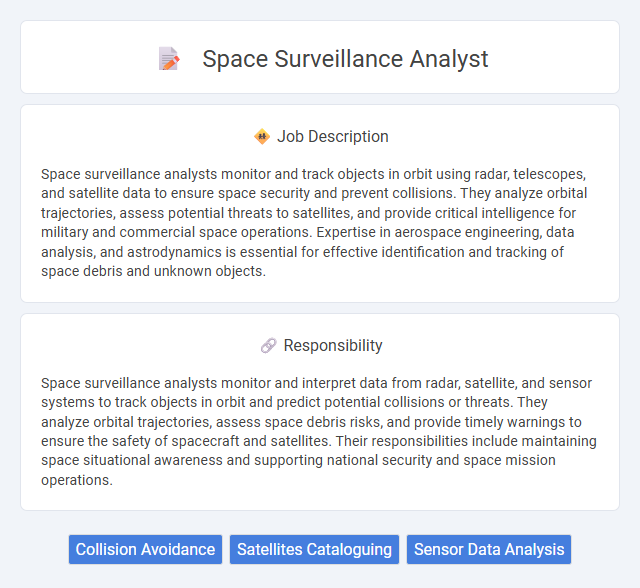
Space surveillance analysts monitor and track objects in orbit using radar, telescopes, and satellite data to ensure space security and prevent collisions. They analyze orbital trajectories, assess potential threats to satellites, and provide critical intelligence for military and commercial space operations. Expertise in aerospace engineering, data analysis, and astrodynamics is essential for effective identification and tracking of space debris and unknown objects.
Individuals with strong analytical skills and an interest in aerospace technology are likely suitable for a Space Surveillance Analyst role, as the job demands careful monitoring and interpretation of space data. Those who can handle high-pressure environments and maintain attention to detail may adapt well, given the critical nature of tracking objects in orbit to prevent collisions. Conversely, people who struggle with sustained concentration or have limited technical aptitude might find this role challenging and less suited to their abilities.
Qualification
A Space Surveillance Analyst requires a strong background in aerospace engineering, astrophysics, or computer science, with proficiency in satellite tracking and orbital mechanics. Expertise in data analysis, radar systems, and space situational awareness software is essential for monitoring and predicting the behavior of space objects. Advanced degrees and certifications in space operations or defense intelligence enhance qualifications for handling complex space environment assessments.
Responsibility
Space surveillance analysts monitor and interpret data from radar, satellite, and sensor systems to track objects in orbit and predict potential collisions or threats. They analyze orbital trajectories, assess space debris risks, and provide timely warnings to ensure the safety of spacecraft and satellites. Their responsibilities include maintaining space situational awareness and supporting national security and space mission operations.
Benefit
A Space Surveillance Analyst likely benefits from engaging in high-demand, cutting-edge technology fields that emphasize national security and space situational awareness. The role may offer competitive salaries, opportunities for career growth, and the chance to work with advanced data analytics and satellite tracking systems. Benefits probably include access to specialized training, collaboration with aerospace and defense experts, and contributing to critical missions that safeguard space assets.
Challenge
Space surveillance analyst roles likely involve monitoring vast amounts of data from satellites and sensors, presenting a challenge in maintaining accuracy and timeliness. The complexity of tracking multiple objects in orbit increases the probability of requiring advanced analytical skills and quick decision-making. Navigating evolving space technologies and potential threats may further heighten the difficulty level associated with this position.
Career Advancement
Space surveillance analysts play a crucial role in monitoring and tracking objects in Earth's orbit to ensure the safety of satellites and spacecraft. Career advancement in this field often involves gaining expertise in orbital mechanics, signal processing, and cybersecurity, leading to roles such as senior analyst, mission planner, or space operations manager. Pursuing certifications in space systems and defense technologies, along with advanced degrees in aerospace engineering or computer science, enhances promotion potential and leadership opportunities within government agencies or private aerospace companies.
Key Terms
Collision Avoidance
Space surveillance analysts specializing in collision avoidance track and analyze objects in Earth's orbit using radar, telescopes, and satellite data to predict potential collisions. They develop and implement strategies to maneuver satellites and mitigate risks, ensuring the safety of critical space assets. Their work supports space situational awareness and helps maintain sustainable orbital environments.
Satellites Cataloguing
Space surveillance analysts specializing in satellites cataloguing monitor, track, and maintain comprehensive databases of orbiting objects to ensure space situational awareness. They utilize radar, optical sensors, and data fusion techniques to identify and classify satellites, debris, and potential threats in Earth's orbit. Precision in updating satellite orbital parameters enhances collision avoidance strategies and supports space traffic management initiatives critical for national security.
Sensor Data Analysis
A Space Surveillance Analyst specializing in sensor data analysis interprets complex data collected from radar, optical, and infrared sensors to track and characterize objects orbiting Earth. This role requires expertise in signal processing, data fusion, and anomaly detection to ensure accurate identification and monitoring of satellites, debris, and other space assets. Proficiency in utilizing advanced analytical tools and algorithms enhances situational awareness and supports decision-making for space traffic management and collision avoidance.
 kuljobs.com
kuljobs.com